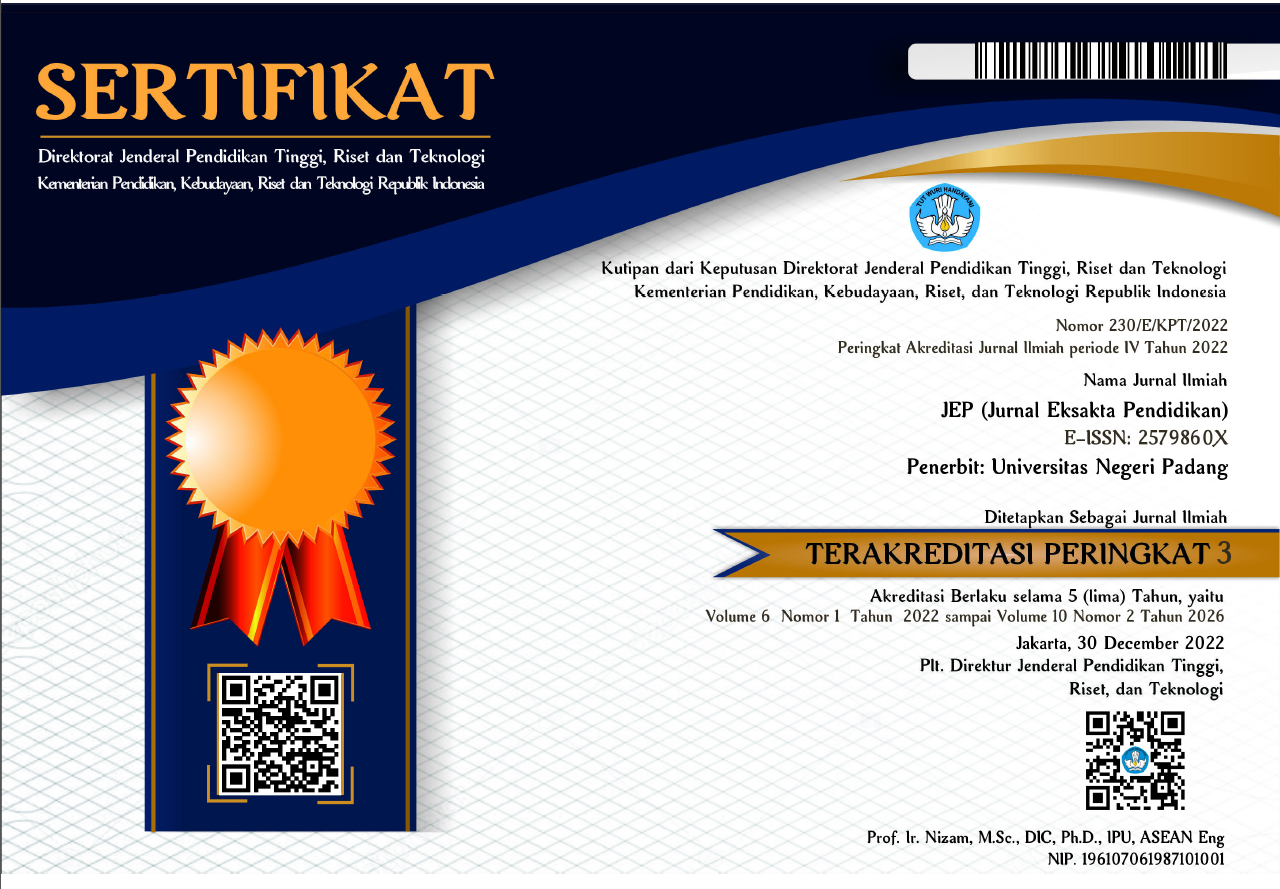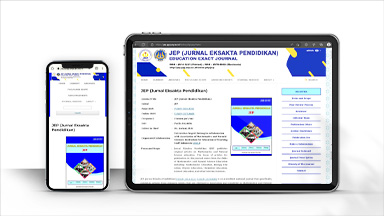Efektivitas Penggunaan Modul Larutan Penyangga Berbasis Discovery Learning terhadap Hasil Belajar Siswa Kelas XI MIA SMAN 7 Padang
Abstract
Quasi experiment research with randomized control posttest group only design was carried out to determine the effectiveness of using a discovery learning based module on students learning outcome. Grade XI MIA-1 to MIA-4 students academic year 2015/2016 in SMAN 7 Padang became population of this study. Through cluster sampling technique, grade XI MIA-1 and grade XI MIA-4 were chosen as experiment and control classes respectively. The experiment class was taught using discovery learning based module in buffer solution topic while the control class was taught the same topic conventionally without the module. Research instrument used was cognitive learning outcome test with multiple choice form. Data showed that the mean test score of experiement class (78.84) was higher than that of control class (71.09). Normality and homogenity test proved that both classes were homogeneous and normally distributed. T-test, as data analysis taken, showed that t-count (3,51) is bigger than t-table (1.67). Thus, it could be concluded that students’ cognitive learning outcome in experiment class is significantly higher than that in control class. The use of discovery learning-based module in buffer solution topic was effective in increasing learning outcome of grade XI MIA students in SMAN 7 Padang.
Downloads
References
Arikunto, S. 2009. Dasar- Dasar Evaluasi Pendidikan (Edisi Revisi). Jakarta: PT Bumi Aksara.
Balim, AG. 2009. The Effects of Discovery Learning on Students’ Success and Inquiry Learning Skills. Egitim Arastirmalari-Eurasian Journal of Educational Research. No. 35. Hlm: 1-20.
Departemen Pendidikan Nasional. 2008. Pengembangan Bahan Ajar. Jakarta: Departemen Pendidikan Nasional, Direktorat Jenderal Manajemen Pendidikan Dasar dan Menengah, Direktorat Pembinaan Sekolah Menengah Atas.
Febriana, BW., Ashadi, dan M. Masykuri. 2014. Pengembangan Modul Kimia Berbasis Problem Based Learning (PBL) Pada Materi Senyawa Hidrokarbon dan Turunannya Kelas XI SMK Kesehatan Ngawi. jurnal.fkip.uns.ac.id.
Galuh, AI., Agung NCS., dan Sukardjo J.S. 2015. Penerapan Model Pembelajaran Discovery Learning untuk Meningkatkan Aktivitas dan Prestasi Belajar Pokok Bahasan Larutan Penyangga pada Siswa Kelas XI IPA Semester II SMA Negeri 1 Ngemplak Tahun Pelajaran 2013/2014. Jurnal Pendidikan Kimia (JPK). Vol. 4 No. 2. Program Studi Pendidikan Kimia. Universitas Sebelas Maret. Hal. 65-73.
Gay,R L, dkk.2000. Educational Research: Competencies for Analysis and Applications. New Jersey: Pearson.
Hosnan. 2014. Implementasi Saintifik dan Kontekstual dalam Pembelajaran Abad 21. Bogor: Ghalia Indonesia
Novianty I, Oktavia S, dan Neena Z. 2014. Efektivitas Penerapan Modul Materi Analisis Elektrokimia Berbasis Inkuiri Terbimbing Terhadap Hasil Belajar Dan Persepsi Siswa Kelas XI Semester 1 Kompetensi Keahlian Kimia Analisis SMKN 7 MALANG. Universitas Negeri Malang: jurnal-online.um.ac.id.
Permendikbud Tahun 2014 Nomor 59. 2014. Tentang Kurikulum 2013 Sekolah Menengah Atas/Madrasah Aliyah.
Prastowo, A. 2011. Panduan Kreatif Membuat Bahan Ajar Inovatif. Yogyakarta: DIVA press.
Putri, TP., Noor F, Ratu BR. 2014. Model Discovery Learning dalam Meningkatkan Keterampilan Berpikir Fleksibel pada Materi Asam-Basa. Jurnal Pendidikan dan Pembelajaran Kimia (JPPK) Vol. 3 No. 2. Program Studi Pendidikan Kimia FKIP Universitas Lampung.
Sudjana. 2005. Metode Statistik. Bandung: Tarsito
Sugiyono. 2008. Metode Penelitian Pendidikan : Pendekatan Kuantitatif, Kualitatif dan R & D. Bandung: Alfabeta.
Sunaringtyas K, Sulistyo S, Mohammad M. 2015. Pengembangan Modul Kimia Berbasis Masalah pada Materi Konsep Mol Kelas X SMA/MA Sesuai Kurikulum 2013. Jurnal Inkuiri. Vol. 4. No.2 . Hal: 36-46.
Udo, ME. 2010. Effect of Guided-Discovery, Student-Centred Demonstration and the Expository Instructional Strategies on Students’ Performance in Chemistry (Pp. 389-398).An International Multi-Disciplinary Journal, Ethiopia.Vol. 4 (4), Serial No. 16, October, 2010
Uside, ON. 2013. Effect Of Discovery Method On Secondary School Student’s Achievement In Physics In Kenya. Asian Journal Of Social Sciences & Humanities. Vol. 2, No. 3 hal. 357.
Vaino K, Jack H and Miia R. 2012. Stimulating students’ intrinsic motivation for learning chemistry through the use of context-based learning modules. Chemistry Education Research and Practice. Vol. 13, 410–419.
Yerimadesi, Bayharti, Fitri H, dan Wiwit FL. 2016. Pengembangan Modul Kesetimbangan Kimia Berbasis Pendekatan Saintifik Untuk Kelas XI SMA/MA. Journal of Saintek. Vol. 8. No. 1 Hal: 85-97.
Yerimadesi, Budhi O, dan Wilda ZF. 2015. The Development of Discovery Learning–Based Module in Buffer Solution Topic for Senior High School Instruction. Proceeding The International Conference on Mathematics, Science, Education and Technology (ICOMSET). Chemistry Education. Hlm: 206-210.

This work is licensed under a Creative Commons Attribution 4.0 International License.




_(2579-860X).png)
_(2614-1221)1.png)




